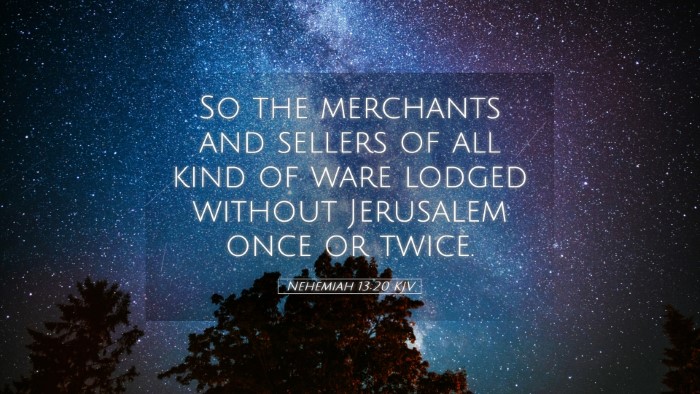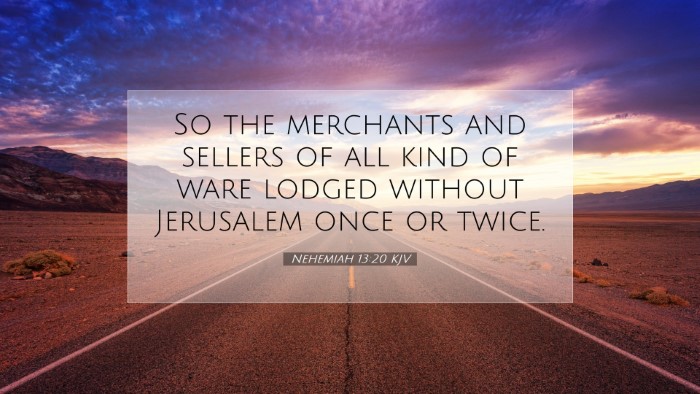Commentary on Nehemiah 13:20
Nehemiah 13:20 states: "So the merchants and sellers of all kinds of wares lodged outside Jerusalem once or twice." This verse presents significant insights into the social and religious life of post-exilic Israel, particularly focusing on the observance of the Sabbath and the commitment to holiness in the city of Jerusalem.
Contextual Background
The verse is situated within a broader narrative of Nehemiah’s reforms upon his return to Jerusalem, after having been stalled by opposition and apathy. Nehemiah's leadership is characterized by a steadfast commitment to restoring both the physical walls of Jerusalem and the spiritual integrity of its inhabitants.
Historical Significance
- Restoration of Law: Following the return from Babylonian exile, there was a strong emphasis on adherence to the Law of Moses. Nehemiah’s reforms were aimed at re-establishing the covenant with God.
- Commercial Practices: The activities of merchants in relation to the Sabbath highlighted a cultural tension between economic pursuits and spiritual commitments.
Theological Insights
Nehemiah 13:20 can be dissected theologically to reveal deeper meanings regarding the Sabbath, idolatry, and the call to holiness:
Sabbath Observance
Nehemiah’s efforts to clear Jerusalem of merchants on the Sabbath underscore the sacredness of this day. The observation of the Sabbath is a theme that resonates throughout the Scriptures as a sign of covenant faithfulness.
- Matthew Henry: Describes the Sabbath as a day set aside for rest and reflection, and emphasizes the necessity of keeping it holy by abstaining from worldly commerce.
- Adam Clarke: Notes that the act of trading during the Sabbath is not merely a breach of law but represents an underlying disregard for divine order.
The Role of the Merchants
The presence of merchants outside Jerusalem raises questions about the complexities of economic life intertwined with religious life:
- Albert Barnes: Indicates that the merchants encamped outside the city in hopes of making sales at the end of the Sabbath, which reflects the temptation to compromise spiritual values for economic gain.
- Matthew Henry: Highlights the perseverance of Nehemiah in enforcing the Sabbath law, regardless of the inconvenience to traders, thus prioritizing divine statutes over personal financial interests.
Pastoral Applications
For pastors and church leaders, Nehemiah 13:20 presents numerous applications:
- Commitment to Spiritual Integrity: Like Nehemiah, church leaders must prioritize the spiritual welfare of their congregations over secular pressures.
- Encouragement to Rest: Encourage parishioners to honor the Sabbath and find rest in God amidst a culture that often glorifies continual productivity.
- Holiness in Practice: Call congregations to a lifestyle that seeks holiness, recognizing that every aspect of life, including commerce, should reflect their commitment to God.
Scholarly Reflections
Bible scholars may reflect on Nehemiah 13:20 in light of socio-economic and cultural studies:
- Cultural Conflict: Scholars can explore how the economic behaviors of ancient Israel reflect contemporary issues regarding work-life balance and the treatment of the Sabbath.
- Intertextuality: This verse can be examined alongside various Biblical texts that discuss the significance of the Sabbath, such as Exodus 20:8-11 and Isaiah 58:13-14, drawing connections to God's overarching themes of rest and security in Him.
Conclusion
Nehemiah 13:20 serves as a critical reminder of the need for vigilance in maintaining the sacredness of the Sabbath and the importance of prioritizing spiritual commitments over worldly distractions. It calls the church to assert its identity as a holy community set apart for God, emphasizing the need for integrity in all aspects of life, including our economic practices. As pastors, students, theologians, and scholars engage with this text, may we be inspired to seek deeper understanding and application of these principles in our lives and communities.


